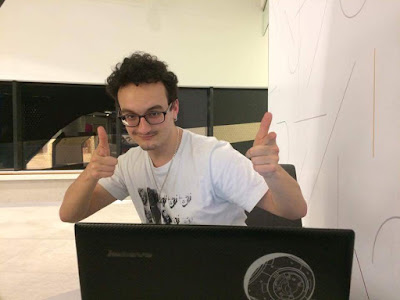PVL Undergraduate Student Brittney Cooper (right) driving the MESR Rover (left) in the Canadian Space Agency (CSA) Mars Yard
following the end of a 2 week long analog mission put on by the Centre
for Planetary Science and Exploration (CPSX) at Western, in conjunction
with CSA, in 2014. This weekend, students from the Toronto area will get their own opportunity to participate in a model or 'analogue' space mission.
By Brittney Cooper
In just under a week, PVL plans to host its first analog rover mission on May 27th. It’s a one-day event for upper year high-school students, and I will be the acting “rover”. Don’t laugh, this is not my first analog mission but it is however my first one acting in the role of a robot. While each mission has its own unique goals and desired outcomes, the overarching reason for conducting this type of exercise lies in education, training and outreach.
Acting on a real-life mission is a unique experience, and it is not easy to know what to expect based upon the experiences you’ve had in previous jobs or in other areas of your life. Analog missions serve as a great tool to train and provide examples of the operation processes, hierarchy and protocol. You get the opportunity to understand how important science decisions are made and rationalized against data and power constraints of your rover or spacecraft. It’s a unique opportunity to gain insight on how hundreds of people are able to work together to design a mission from the beginning. This includes formulating the science outcomes and payloads, and then actually acting out the structured long-term and tactical planning that is carried out regularly, to achieve those outcomes.
Acting on a real-life mission is a unique experience, and it is not easy to know what to expect based upon the experiences you’ve had in previous jobs or in other areas of your life. Analog missions serve as a great tool to train and provide examples of the operation processes, hierarchy and protocol. You get the opportunity to understand how important science decisions are made and rationalized against data and power constraints of your rover or spacecraft. It’s a unique opportunity to gain insight on how hundreds of people are able to work together to design a mission from the beginning. This includes formulating the science outcomes and payloads, and then actually acting out the structured long-term and tactical planning that is carried out regularly, to achieve those outcomes.



